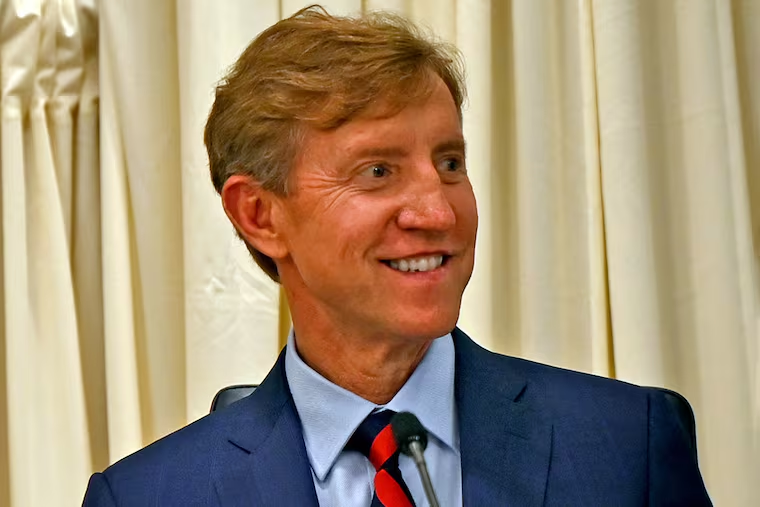Penn’s medical school dean is being eyed as interim president of the university
J. Larry Jameson would step into the role after the Saturday resignation of president Liz Magill, whose congressional committee testimony on antisemitism drew intense scrutiny.

Update: J. Larry Jameson has been named Penn’s interim president. Here’s what to know about him.
J. Larry Jameson, who has served as executive vice president of the University of Pennsylvania’s health system and its medical school dean for more than 12 years, is emerging as a leading candidate to take the role of interim president of the university, according to multiple sources.
Jameson, 69, was referred to as an ideal candidate during a board of trustees meeting last week addressing Liz Magill’s resignation, a source had told The Inquirer. But at that time, the source said, no one had reached out to him yet.
It’s not clear where the board is in the process to appoint an interim president.
“The University’s Board of Trustees is actively working to appoint an interim president, and that process is well underway, with a formal announcement anticipated in the coming days,” the university said in a statement.
Well over half of Penn employees are connected to the health system and medical school — collectively an $11.1 billion enterprise — making it the largest single unit within the university. The Perelman School of Medicine employs more than 2,600 full-time faculty members and more than 3,700 students, trainees, residents, and fellows, according to Penn’s website.
» READ MORE: Penn leadership upheaval could have a ‘chilling effect’ on college presidencies and university operations nationally
It’s unclear how long Jameson — who earned a base salary of nearly $4.5 million in 2021 and additional compensation of $1.1 million, according to the most recent tax filing available — would serve, or whether or when the university would launch a search for a new permanent president.
Other than to announce that Scott L. Bok’s replacement as board chair would be Julie Platt, the board has been mum since Magill’s departure Saturday night in the wake of congressional committee testimony on antisemitism that drew intense scrutiny.
» READ MORE: Penn president Liz Magill has resigned following backlash over her testimony about antisemitism
Jameson will be taking over the presidency at perhaps the most tumultuous time for leadership in the university’s history. Magill’s less-than-18-month tenure was the shortest of any Penn president and followed presidents who served for 10 years and 18 years respectively.
He is already involved in fundraising and managing faculty and has developed a reputation as a strong and thoughtful leader, said several sources close to the administration.
Jameson, a molecular endocrinologist and native of Georgia, came to Penn from Northwestern University, where he had most recently served as dean of the medical school and vice president of medical affairs. He received his medical school degree at the University of North Carolina in 1981 and had worked at Harvard Medical School earlier in his career.
Jameson is the only dean to sit in on what’s known as the “discussion group” at Penn, which is basically the president’s cabinet.
Earlier this year, Penn joined Harvard, Stanford, and Columbia in dropping out of U.S News & World Report’s annual medical school rankings. In a memo to faculty, staff, and students, Jameson said the rankings relied too heavily on test scores and grades, while undervaluing qualities that Penn seeks.
“We strive to identify and attract students with a wide array of characteristics that predict promise,” Jameson wrote. “The careers of transformative physicians, scientists, and leaders reveal the importance of other personal qualities, including creativity, passion, resilience, and empathy.”
Under Jameson’s leadership in 2022, Penn’s medical school formed a partnership with historically Black colleges and universities to attract more students from racial groups underrepresented in medicine.
He oversaw the medical school through the COVID-19 pandemic. After the success of the COVID vaccines made using mRNA technology pioneered at Penn, the medical school in late 2021 opened the Penn Institute for RNA Innovation, to expand the use of the genetic molecules for treating other conditions.
Penn’s health system is directly owned by the university, with clinical, educational, and research operations integrated under a management entity called Penn Medicine.
As executive vice president for the health system and dean of the Perelman School of Medicine, Jameson is in charge of the medical school’s education and research components, but there is some distance between Jameson and the management of the health system and its six acute-care hospitals.
The University of Pennsylvania Health System has its own CEO, Kevin Mahoney, who reports to Jameson, along with the health system’s chief financial officer Keith Kasper. The combination of Penn’s medical school and the health system, marketed as Penn Medicine, had $11.1 billion in revenue in the year ended June 30, 2022, mostly from the health system. That amounted to more than three-quarters of the university’s total revenue of $14.4 billion that year.
On Thursday, two days after Magill’s testimony in which she said it was a “context-dependent decision” when asked if calls for genocide of Jewish people would violate the school’s code of conduct, Jameson and Mahoney put out a statement on genocide.
“Calls for genocide, echoing horrors of the past, violate our behavioral standards and remind us that we must forcefully condemn, prevent, and respond to hate in all forms,” said the Penn Med letter, according to the Daily Pennsylvanian, the student newspaper.
Staff writers Tom Avril and Harold Brubaker contributed to this article.